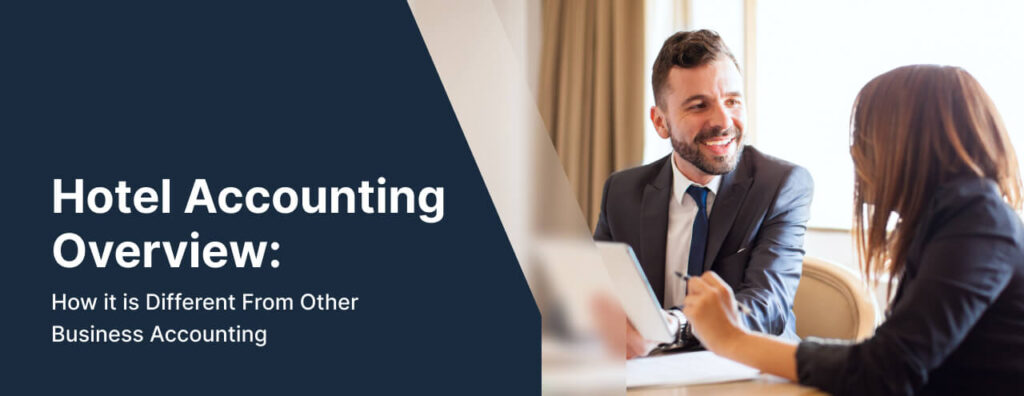Hotel Accounting Overview: How Is It Different From Other Business Accounting?

Is the accounting process the same in every type of business? For the most part, yes, but there are some important differences depending on the industry. Hospitality companies, in particular, have some unique circumstances that make tracking, analyzing, and reconciling financials a bit different than other types of business accounting. Keep reading to discover best practices and key insights for better hotel financial management.
Hotel Accounting vs. General Business Accounting
At its core, accounting involves financial record-keeping and reporting, and while the fundamental process remains consistent across businesses, the complexity can vary depending on the industry. Hospitality, in particular, has many moving parts.
For example, hotels receive their revenue from many areas, including room sales, food and beverage sales, conference and event planning, and on-site services such as health and wellness amenities, laundry, parking, etc. That’s quite a few more revenue streams compared to general business accounting.
The financial structure within hotels also consists of fixed expenses, such as salaries, and fluctuating costs and revenue such as room maintenance and utilities. Room rates also vary based on supply and demand, events, and seasonality.
When it comes to tracking profits, hotels use specific industry metrics to measure their economic stability. This includes occupancy rates, average daily rate, revenue per available room, and gross operating profit.
While general businesses may create monthly or quarterly financial reports, hotels often require some type of daily reporting, which often comes in the form of a night audit.
Challenges in Hotel Accounting
Now let’s explore the specific challenges in hotel accounting.
- Dynamic pricing. There are a lot of fluctuating prices in the hospitality industry, including room rates that can change daily based on availability.
- Seasonality. The time of year can certainly impact a hotel’s revenue. During peak demand, hotels have the ability to charge premium rates. Seasonality also affects staff since more employees may be required to sustain operations during high demand.
- Payroll. Hotels have a variety of roles and shifts, including a combination of full-time, part-time, hourly, salaried, and seasonal workers.
- Multiple revenue streams. Hotels receive revenue from many sources, including room bookings, food and beverage, conferences and events, and on-site amenities.
- Regulatory compliance. Hotels need to navigate tax requirements, labor laws, and data privacy rules all while maintaining accurate records and undergoing occasional internal and external audits.
- Multiple technology and software systems. This includes everything from reservation management, point-of-sale (POS) systems, and property management systems (PMS) to accounting software and customer relationship management (CRM) systems.
- Cash and credit card transactions. While the majority of customers use credit cards during their stay, hotels must be equipped to handle and reconcile all types of payments, including cash and digital wallets. They must also account for credit card fees and chargebacks.
The Role of Technology
There are certain types of hotel-specific accounting software and management systems that are especially designed for the hospitality industry. These systems include POS systems, property management, enterprise resource planning, revenue management systems, and CRM.
These solutions help manage everything from room reservations to reconciliation, and the right platforms will help streamline your accounting, enhance financial accuracy, and provide real-time data. It’s important, however, to integrate your PMS and POS system with the right accounting software and automated reconciliation system. Doing so will not only save your employees hours and enhance compliance, but also reduce the risk of human error that often comes with manual accounting processes.
Hotel Accounting Best Practices
- Use the right technology. There are a lot of options on the market, but the right type of integrated software and automated technology can do wonders for your accounting department by saving time and eliminating human errors.
- Stay up to date on regulatory compliance and industry regulations. This includes everything on the local, state, and federal levels and anything relevant to the hotel industry such as tax and labor laws and privacy regulations.
- Review your finances on a regular basis. Ideally you should reconcile your cash and credit card transactions every day, but 2–3 times per week will suffice.
- Track and analyze key performance indicators (KPIs). Include metrics such as occupancy rates, average daily rate, revenue per available room, and gross operating profit in your financial reports.
Efficient cash and credit card reconciliation is also a crucial aspect of hotel accounting, and more and more businesses are turning to automated software solutions to help facilitate the process and enhance compliance. Download Evention’s eBook — Your Complete Guide To A Better Cash & Credit Card Reconciliation Process — for an in-depth look at how an automated solution can help, plus case studies that show real-world examples of reconciliation software in action.


